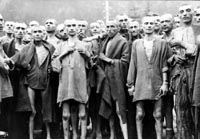Germany to open Nazi death camp archives
German authorities have decided to open Nazi records on 17.5 million Holocaust victims. Speaking at a press conference in Washington, German Justice Minister Brigitte Zypries said her country would open the archives held in the German town of Bad Arolsen and allow historians and survivors access to some 30 to 50 million documents. Germany has until now resisted efforts to open tens of millions of records citing the 1955 Bonn treaty, which imposed a 60-year ban on public access to the archives. The German officials said they would shortly revise their stand on guarding victim privacy.

The Bad Arolsen archives are thought to keep more than 20 million of running meters of documents used by the International Red Cross for identifying victims. The archives contain records pertaining to the former Nazi concentration camps in Buchenwald and Dachau. The records include files on death camp inmates, enslaved laborers and displaced persons from Eastern Europe and Soviet Union. The records had been pedantically put together by the Nazis for many years. For many years the Nazis had pedantically amassed and bound the documents. The archives also contain the postwar records on numerous refugees, which were put together by the Allies.
Historians have long dreamed of getting access to the Nazi records on millions of Holocaust victims. The records were out or reach to the public due to privacy concerns as stipulated in a number of laws. According to the German daily Berliner Zeitung, “the government is going to change its position on the issue following apparent pressure by the United States.” German Justice Minster said during her visit to Washington that “the federal government would support the opening of the archives.”
Until now, the International Red Cross commission has been one of the few institutions that had access to the classified records of the Bad Arolsen archives. For nearly 60 years, the commission has been identifying victims and survivors of the Nazi death camps. The death camp survivors need plenty of paperwork proving their stints in a concentration camp or a forced labor facility so that they might be entitled to damages and benefits. In 2005 alone, the Bad Arolsen archives received more than 150 thousand inquires from the Nazi regime victims. Processing an inquiry usually takes several years to complete due to a lack of information.
German officials previously denied historians access to the archives citing “fairly sensitive personal information” contained in the records. The documents are thought to include lists of the exiled and diseased; registration cards specifying identity, grounds for detention, and some other “medical data.” Berliner Zeitgung points out that “the records contain, without doubt, quite sensitive data because the SS would use them for documenting any ‘asocial’ suspects including homosexuals and criminals. In the meantime, it is still unclear why such documents should remain classified.”
The discussion about whether the public should have broader access to the archives became more intense following severe criticisms leveled at the German government by Paul Shapiro, director of the Center for Holocaust Studies. “The archives keep documents with regard to the Nazi concentration camps system and victims’ sufferings. Secondly, they also keep data on millions of enslaved laborers. And thirdly, the archives keep documents about events that took place after the war, about the homecoming of prisoners and the relocation of refugees. On the whole, that’s the definition of the Holocaust,” said Shapiro.
In the 1980s and 1990s, historians from Germany, Russia and Israel showed a greater interest in the study of documents relating to the Nazi archives. The problem of detailed study of the crimes committed by the Nazi regime reached a peak after the unification of two German states.
The Bad Arolsen archives could enable historians to reconstruct in detail the daily events that occurred in the Nazi death camps. However, the German authorities have until recently refused to provide copies of some documents to the museums of the former concentration camps.
German Justice Minster Brigitte Zypries made a statement during her latest visit to the United States . She said that the German government was likely “to stop resisting the opening of the archives held in Bad Arolsen.” The issue is expected to be finalized at the next meeting of the International Red Cross slated on May 17th. According to Berliner Zeitung, the U.S. Holocaust Memorial Museum that “has funds and powerful lobbyists” is likely to become one of the first institutions to gain access to the documents.”
Strana
Translated by Guerman Grachev
Discuss this article on Pravda.Ru English Forum
Subscribe to Pravda.Ru Telegram channel, Facebook, RSS!

